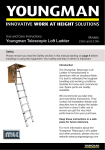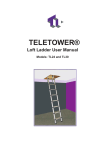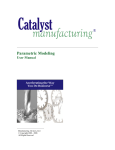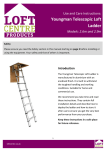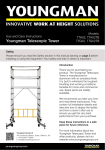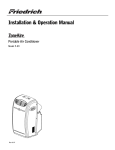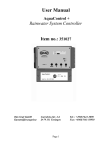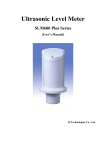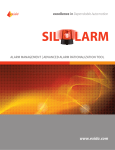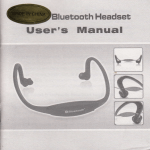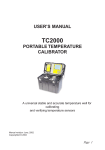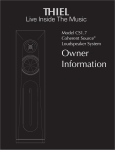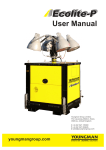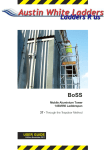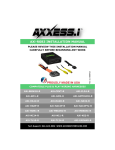Download Telescopic Loft Ladder Manual
Transcript
Use and Care Instructions: Youngman Telescopic Loft Ladder Models: 2.6m and 2.9m Safety Please ensure you read the Safety section in this manual starting on page 4 before installing or using the equipment. Your safety and that of others is important. Introduction The Youngman Telescopic Loft Ladder is manufactured in aluminium with an anodised finish. It is built to withstand the toughest handling and working conditions. Suitable for home and commercial use. Spare parts are readily available. We recommend you take time and read these instructions. They contain full installation details and describe how to deploy the ladder and how to store it after use to ensure you get the very best performance from your purchase. Keep these instructions in a safe place for future reference. Youngman Group Ltd The Causeway, Maldon, Essex, CM9 4LJ, UK t: +44 (0)1621 745900 e: [email protected] youngmangroup.com For more information about the Youngman Telescopic Loft Ladder and other products, please visit our website www.youngmangroup.com Contents Introduction1 Safety1 In the Box2 Important Safety Information3 Safety Considerations3 Servicing and Spare Parts3 Main Features4 Loft Ladder Components Identified5 Step 1: To Install the Loft Ladder 6 Step 2: To Close and Stow the Loft Ladder 13 Step 3: To Open the Loft Ladder 14 Specifications15 Warranty16 In the Box Carefully remove your Youngman Telescopic Loft Ladder and fitments and accessories from the box it arrived in. It is recommended that you retain this packaging should the item need to be returned under warranty. The following items are supplied: • Ladder (x1) • Mounting brackets (x2) • Swivel arms (2) • Hinge swivel pins (x2) • Ladder sub-frame carrier bar (x1) • Ladder sub-frame carrier tubes (x2) - supplied attached to mounting brackets • Springs (x2) • The User Manual (this publication) • Telescopic pole with hook • Mounting bracket fixing screws (x8) These items are shown in the illustration opposite. 2 youngmangroup.com Important Safety Information Warning For your safety, please read all the safety instructions in this Manual before using the Youngman Telescopic Loft Ladder. Safety and quality is of paramount importance when manufacturing Youngman products. Important Read these instructions before installing the Youngman Telescopic Loft Ladder. Important Install the Youngman Telescopic Loft Ladder according the instructions given in this Manual and on the labels affixed to the equipment. Safety Considerations General • Do not install or use the Youngman Telescopic Loft Ladder if damaged in any way. • Never exceed the maximum load of 150 kg. • Never operate any of the red buttons while on the ladder or allow anyone else to operate the buttons while it is in use. Cleaning • Do not use any abrasive or chemical solvents. • Periodically clean with a soft damp cloth. We recommend occasionally spraying with a silicon spray. How to Dispose of this Product When the unit has reached the end of its life, contact your local council regarding available recycling or disposal options. Servicing and Spare Parts When the unit has reached the end of its life, contact your local council regarding available recycling or disposal options. 3 youngmangroup.com Main Features The main features of the Youngman Telescopic Loft Ladder are listed below: • There are two models each adjustable to three lengths for optimium usability. See the table below for details. • Manufactured in anodised Aluminium with steel fixing brackets and fitments. • Fitted with rubber feet for safety and protection of the floor. • Closes down to a small volume and fits into the smallest of spaces. See table below. • The loft hatch must be converted so that the door opens downwards. • Permantly fitted in the loft. • Allows loft hatch to close when stowed a way. • Very easy to operate and use. Loft Ladder Details Floor to Floor Height Model Number Minimum Hatch Size (W x L) Overhang (Distance Behind the Joist) 217 - 261cm TL24 510 x 600cm 235mm 243 - 288 cm TL30 510 x 600cm 235mm Top adjustable tube Loft joist Loft joist Ceiling In room Ceiling In room Floor to ceiling measurement Floor to floor measurement Rungs Loft door Stile tubes of ladder Loft ladder Floor in room 4 youngmangroup.com Loft Ladder Components Identified 2 2 4 3 4 1 9 7 7 10 6 6 5 8 Parts Components 1 Ladder 2 Mounting brackets (x2) 3 Swivel arms (x2) 4 Hinge swivel pins (x2) 5 Ladder sub-frame carrier bar (x1) 6 Ladder sub-frame carrier tubes (x2) 7 Springs (x2) 8 Telescopic pole with hook (x1) 9 Bracket fixing screws (x8) 10 Instructions 5 youngmangroup.com Step 1: To Install the Loft Ladder Installation Consideration The following points should be considered before installing the Loft Ladder. Loft Hatch The loft hatch must be downward opening. It may be necessary to refit your loft hatch door so that it opens downwards so that the hatch when open hangs down behind the ladder when it is deployed. Loft Opening It is recommended that the loft ladder is installed so that it is orientated parallel to the longer side of the opening. This will give the user more comfortable access to the loft and will be easier for the user to take items into the loft. Secure Fixing The two fixing brackets supplied must be attached to a secure part of the loft structure such as a ceiling joist or sound timber bridging and securely fastened to the joists. Footprint When the ladder is opened there should be enough space available at the base of the ladder for a person to easily and safely get onto and climb the ladder. Right mounting bracket Left mounting bracket Ceiling joist CL Loft door opening down Loft aperture 600 x 510 mm minimum Tools You will need the following tools and materials: Pencil, set-square and measuring tape (mm) for marking out. A drill and a 4mm drill bit for drilling the bracket fixing holes and a Posidrive screwdriver for tightening the eight bracket fixing screws. Strong string to extend the springs during installation. 6 youngmangroup.com Step 1: To Install the Loft Ladder Installation Take the first bracket and place it on the mounting board so that it is placed over the bracket centre line and slide it until the lower screw hole is centred on this line. Mark the centre point of this hole. Fixing the Brackets 1.3 Remove the bracket and drill a 4mm diameter hole at the position just marked. Fix the bracket using one of the fixing screws supplied. Similarly drill the other three holes (one on top) and screw in the other screws. Repeat for the other bracket, see Fig 1.3. ............ 1.2 Refer to Fig 1.2 and Fig 1.3. The brackets are supplied with their ladder sub-frame carrier tubes fitted. Note that these brackets are ‘handed’, left bracket and right bracket. ............ Measure 188 mm either side of this line and draw a vertical line at these points greater than 90 mm long to mark the mounting bracket centre lines. Centre Line 1.1 188mm 188mm ............ Marking Out 1.1 Measure and draw the ‘centre line’ on the ceiling joist midway across the width of the loft opening where the mounting brackets will be fitted, Fig 1.1. Ceiling Joist 1.2 Mounting Bracket Fixing Positions Ceiling Joist Left Mounting Bracket Left Mounting Bracket Left Mounting Bracket 1.3 Ceiling Joist Sub-Frame Carrier Tubes 7 youngmangroup.com Step 1: To Install the Loft Ladder Swivel Arm 1.4. Place the Right Swivel arm in position on the Right Mounting bracket and align their holes, Fig 1.4. 1.4 1.5 1.5. From the outer edge, guide the Hinged swivel pin through the arm and bracket holes and push in completely, Fig 1.5. Repeat this procedure with the Left Swivel arm and the Left mounting bracket using the other Hinged swivel pin. 1.6 1.6. The installation will now be at the stage shown in Fig 1.6. Attaching the Springs 1.7. Slide the Ladder sub-frame carrier bar into the hole in one of the sub-frame carrier tubes, see Fig 1.7. Now slide the two spring eyelets onto the bar. 1.8. Slide the other end of the carrier bar into the corresponding hole on the other sub-carrier tube, Fig 1.8. There is groove near each end of the bar for the purpose of holding the spring in place when installed, see Fig 1.8 (inset). Locate each spring in these grooves. 8 youngmangroup.com Sub-Frame Carrier Tube 1.7 Sub-Frame Carrier Bar 1.8 Step 1: To Install the Loft Ladder Extending the Springs The next step is to anchor the free end of the spring to its anchor point on the hinged swivel pin. 1.9 Lay the swivel arms back so they are horizontal. Hook a loop of strong string to the end of the spring. 1.9. Lift the sub-frame carrier tube above the horizontal and pull the string to extend the spring so that it reaches and clips on to the hinged swivel pin, see Fig 1.9 and inset for close-up of spring on the pin. Remove the string. 1.10 1.10. Now slide the spring eyelet along the pin so that it locates in the groove on the pin, see Fig 1.10. Repeat for the other spring. 1.11. The installation will now be at the stage shown in Figure 1.11. 1.11 9 youngmangroup.com Step 1: To Install the Loft Ladder Warning Be very careful when carrying out the next stage as there is no ladder to stop the sub-frame from swinging forward with considerable force if it is moved inadvertently. 1.12 1.12. Pull down on the sub-frame carrier bar until it touches against its stop. 1.13 1.13. The tensioned springs will hold it in this position, see Fig 1.13. Adjusting the Ladder Length 1.14. The ladder length can be extended by 15cm or 30cm from its minimum length to best suit your floor-to-floor height. 1.14 The adjustment tube is shown in Fig 1.14: a. Minimum length - no extension b. Extended by 15cm c. Extended by 30cm a Endcap Remove the two bolts from the endcaps and have them ready to fix the swivel arms to the ladder at step 1.21. b 10 youngmangroup.com c Step 1: To Install the Loft Ladder 1.15. On the side you are adjusting first (left shown here), depress the red button on the top rung to disengage the locking bolt from the top stile. 1.15 1.16. Keep the button pressed and rotate the stile until the required extension position is reached and then release the button, see Figs 1.17 and 1.18a and 1.18b. Hold in the Button 1.16 1.17. The set extension is indicated by the orientation of the grooves on the end cap, see Fig 1.16 and Fig 1.17. Left stile clockwise In Fig 1.17, the setting shows ‘no extension’. View from above top rung 30 15 Top rung 0 Front of ladder Left stile clockwise Left stile View from Viewabove from top rung 30 15 Top Top rung rung 0 1.18c and d. Now carefully pull the stile upwards until the stile is locked in its extended position. 15 0 Right s anti-cloc above top rungLeft stile 90∞ clockwise clockwise 30 1.18b. Shows the end cap rotated 180 degrees clockwise to the 30 cm extension position. 1.17 0 3 15 30 1.18a. Shows the end cap rotated 90 degrees clockwise to the 15 cm extension position. 15 Front of ladder Front of ladder Left stile 90∞ clockwise Left stile 180∞ clockwise 1.18 Righ anti-cl 3 0 15 15 30 Left stile 90∞ clockwise 15 a 30 b 0 30 0 Repeat the same setting on the right-hand top stile from step 1.15. Note that this stile must be rotated 90 degrees and 180 degrees CCW for 15 and 30 cm extensions respectively. 15 Right s anti-cloc Left stile 180∞ clockwise 3 0 15 30 youngmangroup.com Left stile 180∞ clockwise c d 11 15 Step 1: To Install the Loft Ladder Extend the Ladder 1.19. Fully extend the ladder until all rungs are locked. This is indicated in the illustration below by the red buttons being extended. Important Ensure that all the red buttons on the underside of the rungs are in the locked position, see above right. 1.19 Rung Locked 1.19 It is dangerous to climb or attempt to climb the ladder when the rungs are not locked, see right. 1.20. Stand the ladder on the floor below the loft and rest the ladder against the sub-frame with the top of the ladder close to the swivel arms. Climb the ladder and enter the loft to gain access the top of the ladder. Rung Not Locked 1.20 Screw to the Swivel Arms 1.21a. Align the holes in the swivel arm with the threaded hole in the top end of the ladder. 1.21b. Finger tighten the bolt supplied. 1.21c. Use an Allen key to tighten this bolt to securely fix the swivel arm to the ladder ensuring the location pin engages with the groove in the endcap. Repeat for the other side of the ladder. Location Pin 1.21 a b c d 1.21d. Shows both sides of the ladder fastened to the swivel arms. Installation is now complete. 12 youngmangroup.com Step 2: To Close and Stow the Loft Ladder 2.1. Depress the two red buttons on the underside of rung 2 to unlock the rung, see Fig 2.1 then push the rung upwards in the direction of the arrows. 2.1 Rung 3 You can now release your fingers from the buttons and continue to raise the rung. When the rung 2 touches rung 3, it will push in the red buttons and unlock rung 3. Continue to raise rung 2 to now move both rungs up together. Rung 2 Depress Buttons and Lift 2.2. Grip the lower stiles and push up to unlock and close more rungs in the same way. If you can now place the stowage bracket (see Fig 2.4) onto the sub-frame carrier bar, then do so and ignore paragraph 2.3. 2.3. Insert the plain end of pole into the holes in rung 1 and rung 2 and lift up the ladder to close all the rungs and sit the stowage bracket located on the rear of the rung 1, onto the sub-frame carrier bar. 2.4. Use the hook end of the pole and hook onto the carrier bar to raise the ladder. During this operation the springs will pull the ladder into a horizontal position. 2.3 2.2 Rung 1 Pole Stowage Bracket 2.4 Remove the pole and close the loft hatch. Pole Hooked onto Carrier Bar 13 youngmangroup.com Step 3: To Open the Loft Ladder Open the Loft Hatch 3.1. Use the hook end of the pole to pull down on the Ladder sub-frame carrier bar to swivel the ladder to the vertical position. 3.1 Stowage Bracket If at this point, the ladder can be reached by hand then ignore paragraph 3.2 and unhook from the carrier bar and lower to the floor. 3.2. Pass the plain end of the pole through the hole in rung 1 and rung 2. Push the pole up to un-hook the ladder stowage bracket on the rear of rung 1 from the sub-frame carrier bar and carefully lower the ladder. Remove the Pole 3.3. Grip the lower stiles of the ladder and carefully pull it down and extend the ladder. Make sure all the rungs are locked (indicated by the red buttons being extended below the rungs). 14 youngmangroup.com Pole Hooked onto Carrier Bar 3.2 3.3 Specifications Specifications Maximum Load 150 kg Dimensions Model No TL24 Floor-to Floor-height 217cm - 261cm Angle of ladder 65 deg 75 deg Footprint / Max height setting 123 cm 74 cm Mid height setting 116 cm 70 cm Min height setting 111 cm 67 cm Model No TL30 Floor-to-Floor height 243 cm - 288 cm Angle of ladder 65 deg 75 deg Footprint / Max height setting 135 cm 81 cm Mid height setting 129 cm 78 cm Min height setting 123cm 74cm Construction Aluminium Important The Manufacturer and/or their recognized agents, directors, employees or insurers will not be held liable for consequential or other damages, losses or expenses in connection with, or by reason of, or the inability to use the Youngman Telescopic Loft Ladder for any purpose. Youngman Telescopic Loft Ladder User Manual All rights reserved. No part of this publication may be reproduced, transmitted, transcribed, translated or stored in a retrieval system in any form by any means without the written permission of Youngman® Limited. Technical details contained in this publication are correct for the equipment model numbers supplied. The Instruction and Reference Manual will be revised as necessary for subsequent revisions to the equipment. This information will also be published on our website. Copyright Youngman® 2012. 15 youngmangroup.com Warranty Your Youngman Telescopic Loft Ladder is covered by a 12 month warranty. The Company undertakes to replace or repair, free of charge, any defect which the Company considers to be due to faulty workmanship or material within 12 months of the sale date, except for: • Defects arising from neglect, misuse or unauthorised modifications. • Damage caused by abuse, misuse, dropping or other similar damage caused by or as a result of failure to follow transportation, storage, loading or operation, instructions. • Alterations, additions or repairs carried out by persons other than the Manufacturer or their recognized distributors. • Transportation or shipment costs to and from the Manufacturer or their recognized agents, for repair or assessment against a warranty claim, on any or component. • Materials and/or labour costs to renew, repair or replace components due to fair wear and tear. • Faults arising from the use of non-standard or additional parts, or any consequential damage or wear caused by the fitting or use of such parts. Youngman Group Ltd The Causeway, Maldon, Essex CM9 4LJ, United Kingdom t: +44 (0)1621 745900 e: [email protected] youngmangroup.com
















